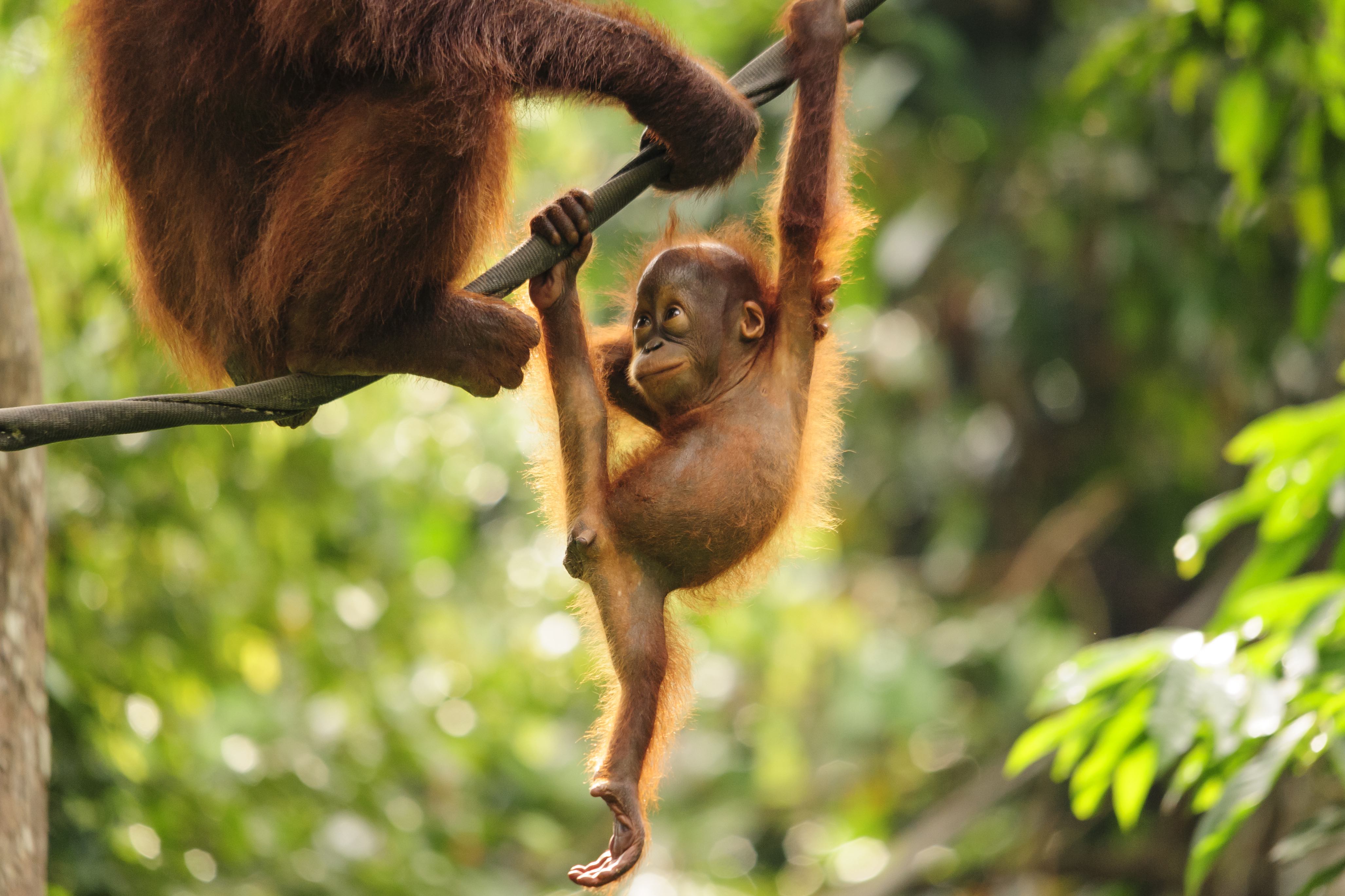
As of last month, the Bornean orangutan (Pongo pygmaeus) is now listed as critically endangered by the IUCN Red List. It joins the closely related Sumatran Orangutan (P. abelii), meaning that both species are now sitting precariously on the brink of extinction.
The orangutan are rainforest apes found in South-east Asia. Mainly arboreal, they spend most of their time foraging for fruit, vegetation, honey and insects high up in the canopy. Orangutan literally translates from Malay as ‘person of the forest’ and they have been known to indigenous peoples for thousands of years. They are also amongst the most intelligent of the primates, and although largely solitary in the wild, they exhibit complex behaviours such as the use of tools and the construction of nests in which to sleep every night.
Unless there is a marked change in strategy, conservation outlook appears to be bleak. The wild population is thought to be around 6,600 orangutan on Sumatra and 54,000 on Borneo, though this is declining and surveys deep in the rainforest pose many challenges. The key threat to their future survival is loss of their rainforest habitat, largely as a result of conversion from forest to agriculture.
However this new Red List status is a wake-up call that could help catalyse action.
There are several criteria that qualify a species as critically endangered—a designation that isn’t applied lightly. One of which is ‘a suspected population size reduction of ≥80% over any 10 year or three generation period.’ For orangutans, which have the slowest reproductive rate of any mammal (reproducing only every six to eight years) there is a projected decline of 86% by 2025. ‘Orangutan conservation is failing,’ declared Andrew Marshall, a scientist involved in the recent assessment.
At the core of this problem is the tropical climate and rich soil, which makes the region ideal for growing palm oil. Despite all the negative connotations, which surround this controversial crop, it is a remarkably nutritious and rich vegetable oil with a high fat content, meaning it has found use in numerous foods. At the same time it provides work and incomes for thousands of people across the region. There is really nothing evil about palm oil in itself.
In addition, its yield far exceeds other crops like rapeseed or soya by as much as 3-5x per hectare. Put another way—if you were to stop using palm oil, and switch to an alternative vegetable oil instead, then you could actually increase deforestation, as more land would be needed to meet demand.
But nevertheless, palm oil is still driving deforestation in the region, which is the key threat to this enigmatic ape. This is because land is being cleared through the draining of swamps and the burning of forest. Despite laws designed to tackle this, enforcement is poor. The most startling fact is perhaps the sheer scale—in Sumatra at least 10.8 million hectares have been designated as palm oil concessions. As monocultures, they fail to support orangutan as well as most of the other biodiversity of the rainforests. So it is very much a case of palm oil being perhaps the least bad of several extremely undesirable options.
Hope lies in perhaps in initiatives like the Roundtable on Sustainable Palm Oil, which encourages plantations to only use degraded land, and avoid primary forest, helping to minimise the negative impact of palm oil production. Although 17% of palm oil is currently certified in this way, the impacts are still being debated.
All we do know is that the survival of the iconic orangutan and the remarkable wildlife with which it shares the forest, depend on conservationists working with industry to tackle this problem, and soon.
[geoip-content not_country=”CA”]
ON THE APP
 Wild Orphans: Torn from the Treetops
Wild Orphans: Torn from the Treetops
The Orangutan may well be the first of the great apes to go completely extinct. Although they share more than 97% of their DNA makeup with humans, local farmers still regard them as either a pet or a pest.
Want to watch Wild Orphans: Torn from the Treetops for free right now? Subscribe to Love Nature and start your 30-day free trial of the best on-demand natural history documentaries out there.
[/geoip-content]

 Wild Orphans: Torn from the Treetops
Wild Orphans: Torn from the Treetops